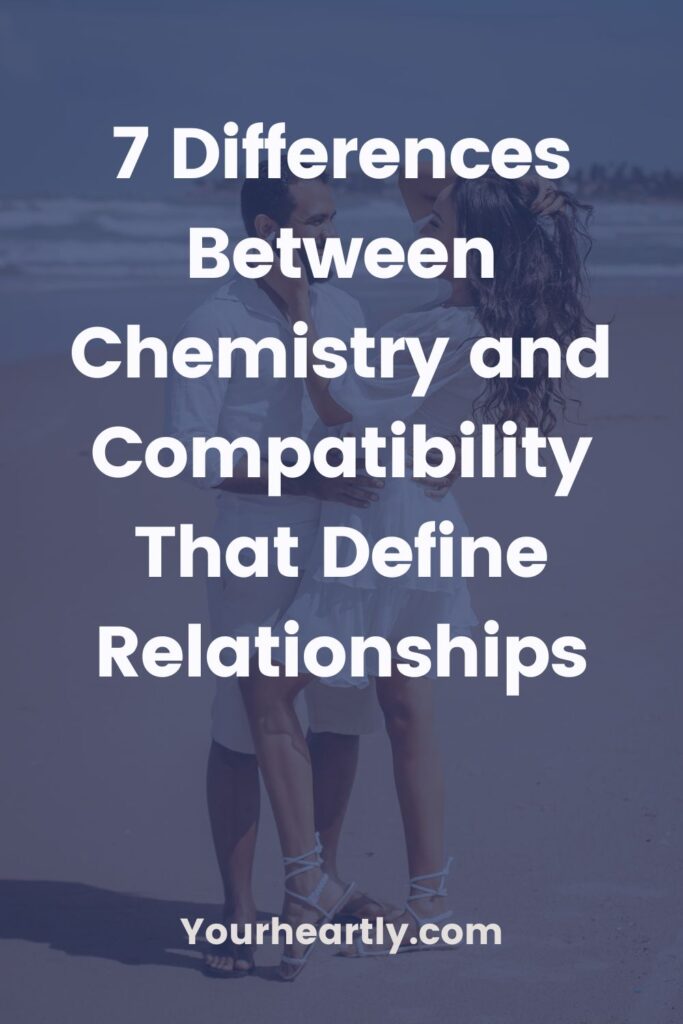When you first meet someone, there’s often that spark—a flutter in your stomach, a rush of excitement, and the feeling that you’ve just connected with someone special. This immediate attraction is what many people describe as chemistry. It’s intoxicating, powerful, and often feels like destiny. But as thrilling as chemistry can be, it doesn’t always translate into a strong, lasting relationship.
That’s where compatibility comes in. While chemistry is about sparks, compatibility is about stability. It’s the deeper connection that helps you feel safe, supported, and understood. It’s not just about how much you want someone in the moment, but how well you can actually build a life together.

You’ve probably heard stories of couples who had incredible passion in the beginning but couldn’t make things work in the long run. On the other hand, some couples may not have had fireworks at first, but over time built a steady, fulfilling partnership because they were truly compatible. Both chemistry and compatibility play important roles, but they aren’t the same thing—and knowing the difference can save you a lot of heartache.
If you’ve ever wondered whether your relationship is built on fleeting attraction or genuine long-term potential, you’re not alone. Many people confuse the two, assuming chemistry equals love or that compatibility means settling. The truth is, they serve very different purposes.
In this article, we’ll explore 7 key differences between chemistry and compatibility to help you understand how both impact your relationships. By the end, you’ll not only recognize the difference but also learn how to balance both for healthier, more fulfilling connections.
1. Chemistry is Instant, Compatibility is Gradual
Chemistry often hits you right away. It’s that undeniable attraction you feel when you meet someone for the first time. You might notice the way they smile, the tone of their voice, or even the subtle body language that draws you in. Chemistry is powerful because it’s fueled by emotions and sometimes even physical reactions—your heart races, your palms sweat, and you feel excited just being near them.
Compatibility, on the other hand, doesn’t always reveal itself immediately. Instead, it develops over time as you get to know someone’s values, habits, and lifestyle. You might not feel fireworks right away, but as you spend more time together, you realize you share the same outlook on life, similar goals, and complementary personalities.
Think about it this way: chemistry can make you want to stay up all night talking, while compatibility helps you decide if you can handle life’s ups and downs together. Chemistry gives you excitement in the beginning, but compatibility ensures you can last through the middle and end.
When you only rely on chemistry, relationships may burn hot and fast but fizzle out. Compatibility ensures the bond has depth and can survive beyond initial attraction. Ideally, you want both—instant spark and steady connection—but if you must choose, compatibility is the glue that keeps two people together.
2. Chemistry Thrives on Passion, Compatibility Thrives on Stability
Chemistry is passion-driven. It makes your heart race and your emotions run high. The energy between you and your partner feels electric, and sometimes it can even feel addictive. You might constantly think about the person, replay conversations in your head, or feel a strong urge to be around them. This passion is what makes chemistry so exciting—but it can also make it volatile.
Compatibility is grounded in stability. It’s less about butterflies and more about peace of mind. With a compatible partner, you feel safe, supported, and secure. You don’t have to guess their feelings or worry about dramatic highs and lows. Instead, you build routines, trust, and mutual understanding. Compatibility provides the foundation that passion alone can’t sustain.
Passion may ignite the flame, but stability keeps it burning. Without compatibility, that intense attraction might eventually lead to frustration or disappointment when real-life challenges come up. Stability doesn’t mean boring; it means your relationship has enough balance to weather storms together.
When you recognize the difference between passion and stability, you can start to appreciate both. Chemistry gives you the thrill, while compatibility gives you the peace—and together, they create a relationship that’s both exciting and enduring.
3. Chemistry Focuses on Emotions, Compatibility Focuses on Values
Chemistry is fueled by emotions. It’s the excitement, nervousness, or joy you feel when you’re around someone you’re drawn to. You might not be able to explain why you’re attracted, but your emotions tell you that you are. These feelings can be overwhelming, and they often make people believe they’ve found “the one.”
Compatibility, however, is rooted in shared values. It’s not just about how you feel in the moment, but about whether you and your partner believe in the same core principles. Do you both want children? Do you have similar views on money, family, and career goals? Compatibility ensures your long-term priorities align, making it easier to navigate life together.
The challenge is that emotions can be misleading. Just because you feel strongly for someone doesn’t mean your relationship will succeed if your values don’t match. A couple can have incredible chemistry but constantly fight about money or lifestyle choices.
On the other hand, when you share values, your relationship has a strong foundation. You’re more likely to respect each other’s decisions and work toward common goals. Emotions come and go, but values shape how you build a life together. Recognizing this difference can help you avoid chasing passion while ignoring the practical realities of partnership.
4. Chemistry Creates Desire, Compatibility Creates Comfort
When you’re drawn to someone physically or emotionally, that’s chemistry at work. It creates desire, excitement, and a strong pull to be around the person. This is why chemistry is often linked to romance—it makes you want to hold hands, kiss, and share intimate moments.
But while chemistry creates desire, compatibility creates comfort. Comfort doesn’t mean lack of attraction; it means feeling at ease with your partner. You can be your true self without fear of judgment. You don’t feel pressured to impress, and you know your partner accepts you for who you are.
Desire is thrilling, but comfort is what allows relationships to last. A strong bond means you can sit in silence together without awkwardness, share your fears, or simply relax knowing you’re supported. Compatibility ensures your relationship isn’t just exciting but also safe and nurturing.
Couples who focus only on desire often find their connection fading once the initial excitement wears off. But when desire is paired with comfort, love becomes both passionate and enduring. Recognizing the need for both can help you build a relationship that’s equally thrilling and deeply fulfilling.
5. Chemistry Relies on the Present, Compatibility Plans for the Future
Chemistry makes you focus on the now. It’s about enjoying the moments you share—the laughter, the attraction, the butterflies. When you’re caught up in chemistry, the present feels so strong that you might not think too far ahead. You simply want to be with the person, right now, without considering what’s next.
Compatibility, however, is about the future. It’s not just how you feel today, but whether your relationship has the potential to grow. Compatible couples talk about long-term plans, such as where they want to live, how they’ll manage finances, or what their shared dreams look like. Compatibility gives your relationship direction and purpose beyond immediate attraction.
When you only rely on chemistry, you may find yourself in a relationship that feels great today but doesn’t align with your long-term vision. On the other hand, compatibility ensures that your goals and dreams complement each other, making it easier to build a lasting partnership.
In healthy relationships, chemistry adds joy to the present, while compatibility provides hope for the future. When both are present, you not only enjoy where you are now but also look forward to where you’re going together.
6. Chemistry is Spontaneous, Compatibility is Intentional
Chemistry often happens without effort. You don’t plan it, and you can’t force it. It’s that instant spark you feel when you meet someone who excites you. It feels spontaneous, magical, and sometimes even irrational. This spontaneity is what makes chemistry so alluring.
Compatibility, however, requires intention. It doesn’t just happen—it’s built. You get to know each other’s habits, communicate openly, and make compromises. Compatibility requires effort, patience, and a willingness to grow together. It’s less about magic and more about choice.
Spontaneity can bring excitement, but without intention, relationships may not survive challenges. Compatibility ensures you both put in the work to maintain the relationship. It means choosing each other even when things aren’t easy.
The most successful relationships balance both. Chemistry gives you the thrill of spontaneity, while compatibility makes sure you’re both intentional about building a strong, healthy bond. When you recognize the difference, you’ll value both the spark and the commitment it takes to keep love alive.
7. Chemistry Can Fade, Compatibility Endures
Perhaps the biggest difference between chemistry and compatibility is longevity. Chemistry, as powerful as it feels, can fade with time. The butterflies eventually settle, and the excitement of newness wears off. If a relationship is built only on chemistry, it may struggle once the intensity lessens.
Compatibility, however, tends to endure. When you share values, goals, and mutual respect, your bond deepens over time. Even when the initial spark fades, compatibility helps you stay connected and committed. It gives you a reason to keep showing up for each other, even during difficult times.
That doesn’t mean chemistry isn’t important—it is. Most people want to feel both attraction and connection. But compatibility is what makes love last. When you’re compatible, you can rebuild chemistry through shared experiences, intimacy, and effort. Without compatibility, once chemistry fades, there’s often nothing left to hold the relationship together.
A lasting relationship isn’t about choosing one over the other—it’s about finding a balance. Chemistry starts the fire, but compatibility keeps it burning strong for years to come.
Conclusion
Understanding the difference between chemistry and compatibility can transform the way you approach relationships. Chemistry gives you the spark, the passion, and the thrill of attraction. It’s what makes your heart race and your eyes light up. But chemistry alone isn’t enough to sustain a long-term partnership.
Compatibility, on the other hand, provides the stability, comfort, and shared values that make a relationship last. It ensures you’re not just enjoying the present, but also building a future together. Without compatibility, even the strongest attraction can fall apart when life gets hard.
If you want a truly fulfilling relationship, don’t choose between chemistry and compatibility—strive for both. Look for someone who excites you but also understands you, challenges you but also supports you, and sparks passion while sharing your values.
When you find that balance, you create a relationship that’s not only thrilling but also deeply meaningful. One that can survive beyond the butterflies, grow through challenges, and last for a lifetime.
FAQs
1. Can a relationship survive on chemistry alone?
No. While chemistry is important, it usually fades over time if there isn’t compatibility to support the relationship.
2. Is compatibility more important than chemistry?
Yes, for long-term success. Chemistry is great for attraction, but compatibility ensures stability and growth.
3. Can chemistry develop over time in a compatible relationship?
Absolutely. Sometimes chemistry grows as emotional intimacy and trust deepen.
4. How do you know if you’re compatible with someone?
You share similar values, life goals, and respect each other’s differences while feeling comfortable being yourself.
5. What’s the best balance of chemistry and compatibility?
The ideal relationship has both—enough chemistry to keep things exciting and enough compatibility to make it last.





